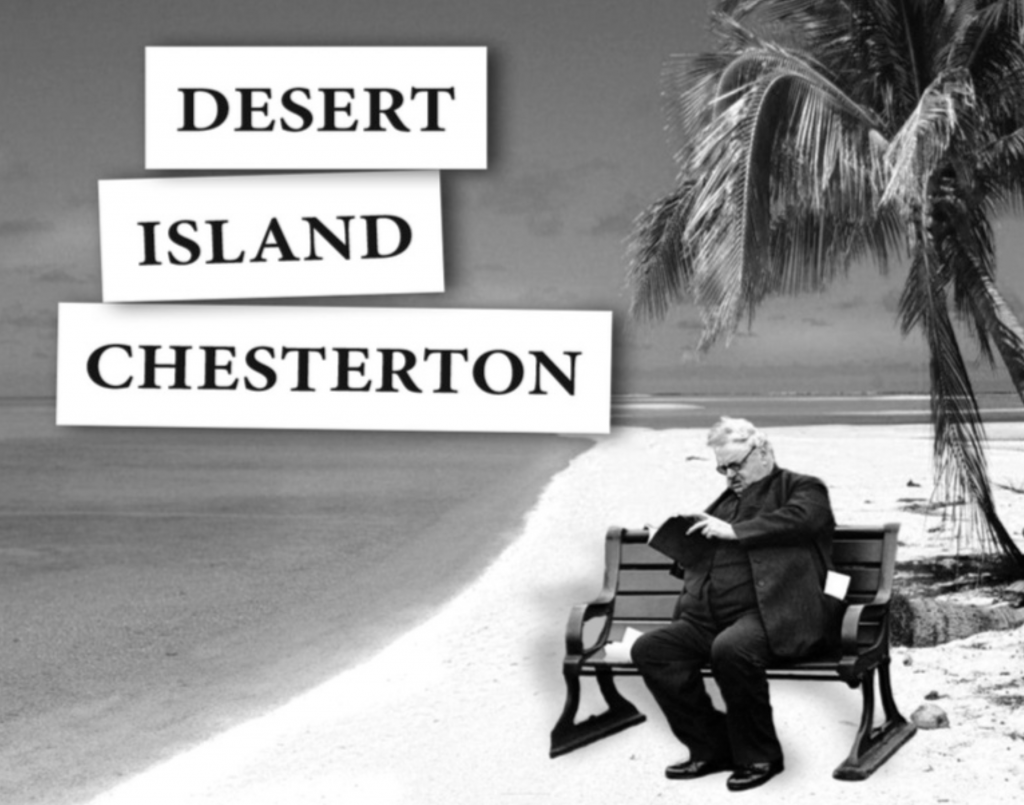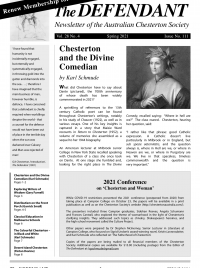Revisiting Chesterton’s 1912 novel, Manalive, as part of our occasional series, Desert Island Chesterton, enables Fintan Devine to highlight the deep truths that Chesterton revealed in the main character of Innocent Smith and the other characters.
Fintan has his own law practice in Wellington, New Zealand, together with his wife, Monica, who contributed the article, “Chesterton – A New Zealand Experience,” to the Winter 2020 issue of The Defendant.

As far as I know, GKC did not write a practical guide to ship
building – or a practical guide to building anything for that
matter.
If he had I am not sure that I would be guided by his design, though no doubt a read would be rewarded with amusement, insight and truths about our existence that can’t be learnt from building boats.
If his collected works, hard backed for longevity and large print in case of failing eyesight, do not qualify as a single work, then the Chesterton book I would take to my desert island would be Manalive.
The title itself is pregnant with possibilities. For at least the first week of my solitude I would whisper, shout and sing ‘Manalive’, and not just in gratitude for being one.
The title conveys a good deal about the book. Innocent Smith is a man alive and one who brings life to others. For that first week or so, my reflection would be a consideration of the manifold meaning conveyed by that simple but inspired coupling of the two essential characteristics that we share – humanity and existence – and the wonder of both.
For the next month or so, I would write it in the sand, arrange it with driftwood and seaweed, carve it on tree trunks and scratch it on rocks. If I could make it with fire I would write it in the flames. If this resulted in my rescue I would be the last to complain, but if it did not I would do it as a lasting tribute to the genius of Gilbert Keith Chesterton.
I first read Manalive either at the end of my school years or the beginning of university. It was the perfect antidote to the dull philosophies that I had encountered or been force- fed with by the books that I had read and studied at that time.
I suppose the teachers and professors were not much to blame for that as they were probably only following orders. I could name a hatful of brilliant writers all afflicted with ideas akin to those of Dr Warner making man a monster, a machine, a being trapped by fate in a meaningless existence, etc etc.
That was the literary landscape into which Manalive swept like the wind through Beacon House, bringing ‘a wave of unreasonable happiness’ on the day Innocent arrives. Turns out that the happiness is perfectly reasonable, and it has always been the work of artists and writers to illustrate and describe it. Chesterton knew it, and Innocent Smith reveals it.
Close on the heels of the wind came Innocent Smith. Innocent, not as without sin or naïve, but innocent of the ideas peddled by Dr Warner and Mr Cyrus Pym and that clouded the minds of Arthur Inglewood and the other occupants of Beacon House.
Smith, as suggested by his quintessential English name, shows his ordinariness. If Innocent Smith is allegorical he is also anatomical. From leaping fences, catching hats with his feet and climbing on to rooftops, he is a very physical presence in the book.
Innocent Smith does ordinary things in extraordinary ways to wake the inhabitants of Beacon House to the wonder of the world. This contrasts with the dull and lifeless mental abstractions of Dr Warner. These attributes of Mr Smith also remind us that we are corporeal as well as spiritual united in one individual.
Diana Duke, Rosamund Hunt, Michael Moon and Arthur Inglewood: different in personality, habits and outlook, but the same in being somehow unhappy with their lots and at odds with each other.
Innocent Smith almost literally turns their world upside down, and when they come back down they are right way up at last, and no longer at odds.
I finish with a word about Mr Moses Gould. He comes into his own during the trial. Dr Warner and Cyrus Pym are the theorists, but Moses Gould raises the practical objections to the revelation that is Innocent Smith.
His ilk abounds today. The objections of Moses Gould fall before the truths that the trial reveals. May his fate be that of the naysayers of today. Read this book.
